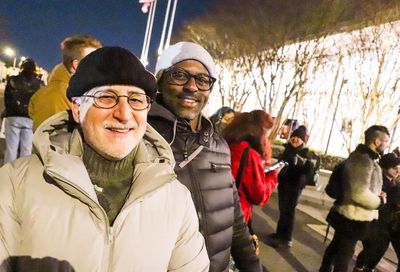DC Eagle to temporarily close while license is suspended for 7 days
Bar also fined $2,000 due to an altercation between D.C. Councilmember Vince Gray and a bouncer

The DC Eagle, the District’s popular leather bar, will have its license suspended for seven days in response to a physical altercation between one of its employees and a D.C. councilmember last fall.
The decision, handed down by the District’s Alcoholic Beverage Regulation Administration, will lead to the suspension of the establishment’s license from Saturday, March 23 to Friday, March 29. Under the ABRA settlement, the DC Eagle also agrees to pay a $2,000 fine within 90 days. If the bar fails to pay the fine within that time period, their license will be suspended again until all money is paid.
Aaron King, a spokesman for ABRA, said that upon receiving information from MPD Officer Desiree Walker, ABRA’s enforcement division launched an investigation into an alleged assault in which a DC Eagle employee, acting as a bouncer, had assaulted D.C. Councilmember Vincent Gray (D-Ward 7) when the councilmember tried to enter the establishment on Sept. 29, 2018, and failed to provide an identification document containing his date of birth.
King said that investigators asked to interview DC Eagle personnel and review security footage to ensure they provided as many details as possible to the Alcoholic Beverage Control Board, which would ultimately issue the final decision and assess any penalties against the bar, if needed.
When asked why the DC Eagle would be penalized for demanding an ID with an official birth date on it — a policy followed by nearly all establishments serving alcohol in the District — King issued the following statement via email.
“Bars are permitted to card patrons prior to entry provided they do not do so on a discriminatory basis. However, there is no specific requirement in District law that they do so. Alcohol establishments are responsible for taking reasonable steps to ascertain whether any person they sell, serve, or deliver an alcoholic beverage to is of legal drinking age. Any person who supplies a valid identification document showing his or her legal age to be the legal drinking age is deemed to be of legal drinking age.
“In the event that a licensee requests a valid identification document from a patron and the patron does not possess one, District law prohibits the licensee from selling, serving or delivering an alcoholic beverage to that patron,” the statement continues. “District law provides an affirmative defense to serving alcohol to a person who lacks an identification document that the patron was at the time of the violation 21 years of age or older.”
According to the case report looking into the incident, ABRA investigators ultimately determined that the former bouncer, who has since been fired, committed a simple assault against Gray, who represents the ward where the bar is located.
Gray said he had come to the establishment as part of Art All Night, a free arts festival for people of all ages held in eight locations throughout the city. As one of the participants in the Minnesota Avenue Main Streets celebration, the Eagle was slated to host a “Glam Squad Photo Shoot,” as well as a silent disco, a DJ battle showcase, and a fire performance.

In an interview with the ABRA investigators, the bouncer said he had first seen a vehicle pull up in the middle of the driveway outside the main entrance. He went outside to tell the driver, later revealed to be Gray, that he could not park there. The bouncer claimed that Gray had an attitude, and initially refused to move his car, but later complied.
Based on video footage from security cameras, Gray entered the DC Eagle, whereupon he showed the bouncer his D.C. Council ID. The bouncer claimed that he could not accept the ID, because it did not contain Gray’s birth date, as he believed that accepting an ID without a valid date of birth would be in violation of ABRA regulations. He claimed that Gray refused to show him another form of ID, and demanded to speak to a manager.
At that point, the bouncer told Gray that he had to leave the premises, and told investigators that the councilmember had told him to “make him leave” and call the police. The bouncer claimed Gray was “belligerent and rude,” and so he tried to forcibly remove him by grabbing him by the waist and attempting to push him out the door, at which point Gray, who had been holding onto the wall, fell to the ground.
Security footage shows the bouncer pushing Gray out the door, then standing over him for a moment after he had fallen and declining to give Gray any assistance. Gray subsequently got up and called police to report an assault. According to the official Metropolitan Police Department report, Gray sustained minor bruises and injuries, including to his back and his thumb, but declined medical attention.
After reviewing security footage of the altercation between Gray and the bouncer, ABRA investigators asked Eagle co-owner Peter Lloyd if the bar had an official security plan to which he reportedly replied, “I don’t think so, but I’m not sure.” The investigators also asked Lloyd if the bar had an official policy for dealing with different types of incidents. Lloyd reportedly responded that there was no formal policy.
As a result, investigators determined that the bar lacked both a settlement agreement and a security plan, and were in violation of D.C. Official Code statute 25-823, which requires establishments serving alcohol to have and abide by both a settlement agreement and a security plan, and ordered the bar to serve a temporary suspension and pay a fine.

In an interview with Metro Weekly, Gray said he had no direct involvement with the ABRA investigation, but praised police for their prompt response and an extensive investigation into the altercation between him and the bouncers.
“I was the one who called the commander of the Sixth [Police] District, and she sent over three detectives. There was a whole crew of police officers who came there, and of course they had video of what happened, which was a horrific experience,” Gray said.
“It is unbelievable that The Eagle was not prepared for the public event, and that’s why I was there,” he added, noting that Art All Night is billed as a public event for people of all ages. “Basically, [the bouncer] rushed from behind the counter after a verbal exchange we had, and grabbed the upper part of my body and pushed me out the door, and pushed me down on the ground. I still have a problem with my thumb as a result of having to catch myself when I fell to the ground.”
Gray said that he was confident that the video footage from the security cameras bolstered his version of the story.
“It was pretty clear that the guy attacked me. When he came up behind me, he stood over me, and said, ‘You’re faking.’ I said, ‘Are you crazy? Faking? Why would I do something like that?’ He had no answer for that. I assume he realized what he had done was wrong,” Gray said. “And the owner came out and said, ‘I just can’t believe this. I’m absolutely aghast at what happened.’ I said, ‘I’m aghast also.’ And the owner told me he was going to fire the staffer immediately.”
When asked if he felt the suspension and fine were sufficient, Gray responded, “Given the fact that I was the victim in this, nothing would probably be quite sufficient… [A] $10,000 fine would be better than $2,000.
“I hope it will teach them a lesson in terms of how they hire people, the vetting process they go through,” he continued. “People have to follow the rules, and if they don’t, there will be a price to pay.”

But Eagle co-owners Herb Kaylor-Hawkins and Ted Clements take issue with ABRA’s decision and its investigation into the incident.
“From my perspective, this entire process has been unfair bias from the very beginning. They sent out investigators to determine both sides of the story,” Kaylor-Hawkins told Metro Weekly. “But the finding of fact as you just announced was completely one-sided. It didn’t mention the fact that Councilman Gray came to the bar and parked in the middle of fire lane, and had to be asked to move.”
“It was a five-minute discussion between him and my doorman that started all this about him parking in the fire lane, and he refused to move,” adds Clements. “And he was actually blocking a police cruiser, the gay liaison cruiser, and they needed to leave, and that’s why he finally moved. It had nothing to do with the doorman… [Gray] had an attitude from the get-go, from my point of view.”
“He was asked, like everybody who walks in the bar, asked for his ID. He showed his council ID, which doesn’t have his birthday and is not a real form of identification as recognized by the district government. So we could not allow him in by law,” Kaylor-Hawkins says, adding that had Gray provided his driver’s license — which he ostensibly should have had on his person in order to be driving a car — the incident could have been avoided.
“Also, at this point, our doorman had just moved to the area three months prior,” adds Clements. “He had no idea who he was dealing with at the time. And, from my point of view, it’s like [Gray] kind of thought he had ‘star power.’ He thought everyone should know who he was, and he did not have to produce his ID. And that’s what kind of started it.”
Kaylor-Hawkins notes that the findings of fact in ABRA report are not listed or taken into account in the final decision issued by the ABC Board.
“The Councilman expected special behavior, and when he didn’t get it, became belligerent,” he says. “The [final decision] doesn’t mention him parking illegally and having to wait for the police to leave before he actually moved his car. They don’t mention the fact that he did not produce a legal accessible form of ID. This entire process has been biased since the very beginning.”
Clements notes that the doorman was never charged with assault for the incident, adding that he believes his employee was provoked by Gray’s behavior.
“I know he was in the wrong, I understand that,” he says of the doorman’s actions. “But, by the same token, there was enough provocation that it wasn’t just one side. That’s according to the police report. And Vincent Gray has yet to accept any responsibility for his actions that night.”
When read ABRA’s response to inquiries about carding practices, the Eagle owners expressed frustration at the prospect of being penalized while trying to abide by other regulations, such as ensuring patrons have valid IDs and are legally able to purchase alcohol.
“Once again, this is like the politics of the ’80s and ’90s, where it seems like it’s stacked against a normal person in favor of politicians that expect all kinds of favors, special treatments, and stuff like that,” Kaylor-Hawkins says. “This is gonna put us in serious financial jeopardy. And Vincent Gray says he’d be happy with a fine that was higher? They gave us the maximum fine! So how in the world could they possibly make it higher? Unless you wanted to change the law again. He refused to follow his own law, and that’s what caused this whole incident, and we have yet to see him take any responsibility for this own actions.”
In an effort to try and recoup the income lost during the suspension, the Eagle plans to revive its Terminal Alley Brick Project, where those interested in financially supporting the bar can purchase a commemorative brick that will be placed in a prominent spot in the bar when the Eagle reopens on Mar. 30, says Miguel Ayala, the Eagle’s promotions and events manager.
Ayala says newly purchased bricks will be displayed along with others that were previously purchased, but never displayed, when the Eagle first opened its doors at its Benning Road NE headquarters. The cost of a single brick will start at $100, though larger donation amounts will also be accepted.
On the night the Eagle reopens, it will host a bar night for the Mr. DC Eagle titleholder and the Men of Onyx’s annual “Code Red Masquerade” party, which raises money for HIV/AIDS, featuring special guest performances by Kevin Aviance and Vjuan Allure.
Despite the hope that the bar can rebound from this setback, Clements notes that “it’s not just the bar that’s being penalized” by the suspension, but the Eagle’s individual employees who won’t be getting paychecks.
“We’re losing one-quarter of our monthly income. Not only any business, but any person who loses 25 percent of their monthly income puts them in serious financial jeopardy,” adds Kaylor-Hawkins. “We have cut our costs everywhere we possibly can already. We’re struggling to keep 30 people employed, many of whom live in Ward 7. And we’re gonna continue to struggle and try to keep [the bar] alive. Whether or not we can, I don’t know.”
Support Metro Weekly’s Journalism
These are challenging times for news organizations. And yet it’s crucial we stay active and provide vital resources and information to both our local readers and the world. So won’t you please take a moment and consider supporting Metro Weekly with a membership? For as little as $5 a month, you can help ensure Metro Weekly magazine and MetroWeekly.com remain free, viable resources as we provide the best, most diverse, culturally-resonant LGBTQ coverage in both the D.C. region and around the world. Memberships come with exclusive perks and discounts, your own personal digital delivery of each week’s magazine (and an archive), access to our Member's Lounge when it launches this fall, and exclusive members-only items like Metro Weekly Membership Mugs and Tote Bags! Check out all our membership levels here and please join us today!

























You must be logged in to post a comment.